Many CEOs have come out against work from home, saying it will ruin the corporate culture. The truth is WFH employees are happier because they don’t have to deal with a toxic in-office culture like being judged by how you look. WFH employees can make friends in real life and don’t need the office to make friends. We just want to get paid. CEOs give lip service to having a great company “culture” but the reality is you’re a disposable resource and will get laid off when company earnings need to look good to investors.
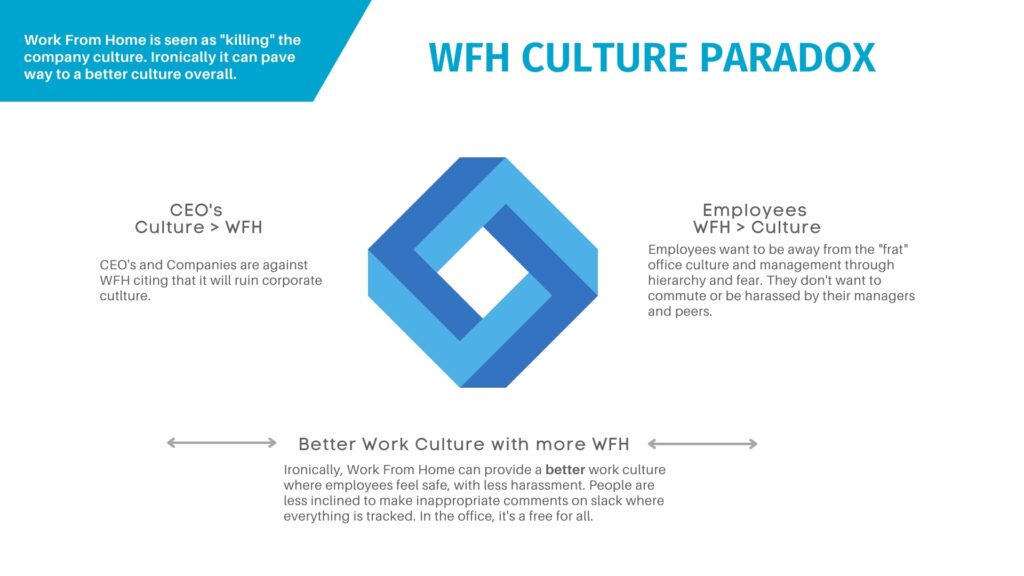
Establishments have argued WFH does not have to dilute your corporate culture. But what if employees don’t care about corporate culture to start? Corporations treat you like mercenaries, yet expect you to be “family.” It simply doesn’t add up.
What Is Corporate Culture And What Is An Example Of A “Good” Company Culture?
Companies define culture as many cliches and pretentious mottos that try to one-up their competition. Let’s take a look at a few examples.
Stripe:
Expectations: “I think the three that really stand out to me are this rigor and clarity of thought, this hunger, appetite, willfulness, determination, and this … warmth and desire to make people around them better off. Those are three that really stand out to me.” -Stripe CEO on culture
What if you’re not one of these people who has “hunger, appetite, willfulness, and determination”? To be fair Stripe allows remote work for all employees, but with a “culture” like that, I will pass to work with non-pretentious people that keeps it real.
Blizzard / Activision:
Let’s take a look at another industry – gaming, and software:
Expectations

Goldman Sachs:
Oh good ole GS, always claiming to have the best culture on Wall Street.
Facebook:
Still carrying that founder culture, both good and bad.
Reality:
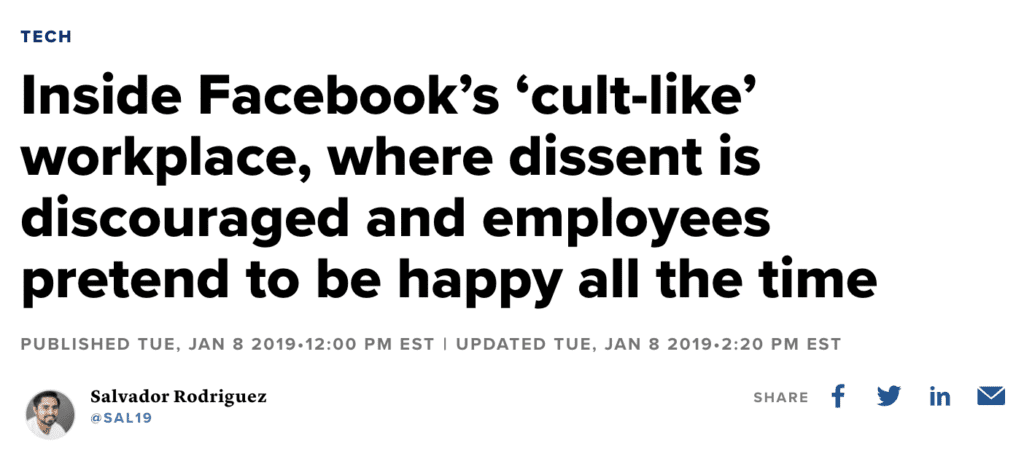
Seeing a trend here? Diversity and inclusion are what every company strives for but in reality, what they provide is what the media calls “frat-boy culture.” I sought to apply to a “sorority-girl” culture company but maybe I need to search outside of companies promising “diversity and inclusion” to find one.
If culture were so important, companies would spend time creating the best culture they can up to this point. Instead, these are the headlines and what people feel about culture.
“If CEO’s care about culture, these headlines would not exist, so don’t use “preserving culture” as an excuse for not letting employees work from home. “
Chloe from Overemployed 🖖
Why Work From Home (WFH) Employees Don’t Care About Corporate Culture
With stories like these, it makes people want to WFH and not be in the same office to experience the “culture.” Ask yourself, do you make close friends at work? If you have a good friend circle in life, do you care to make friends at work?
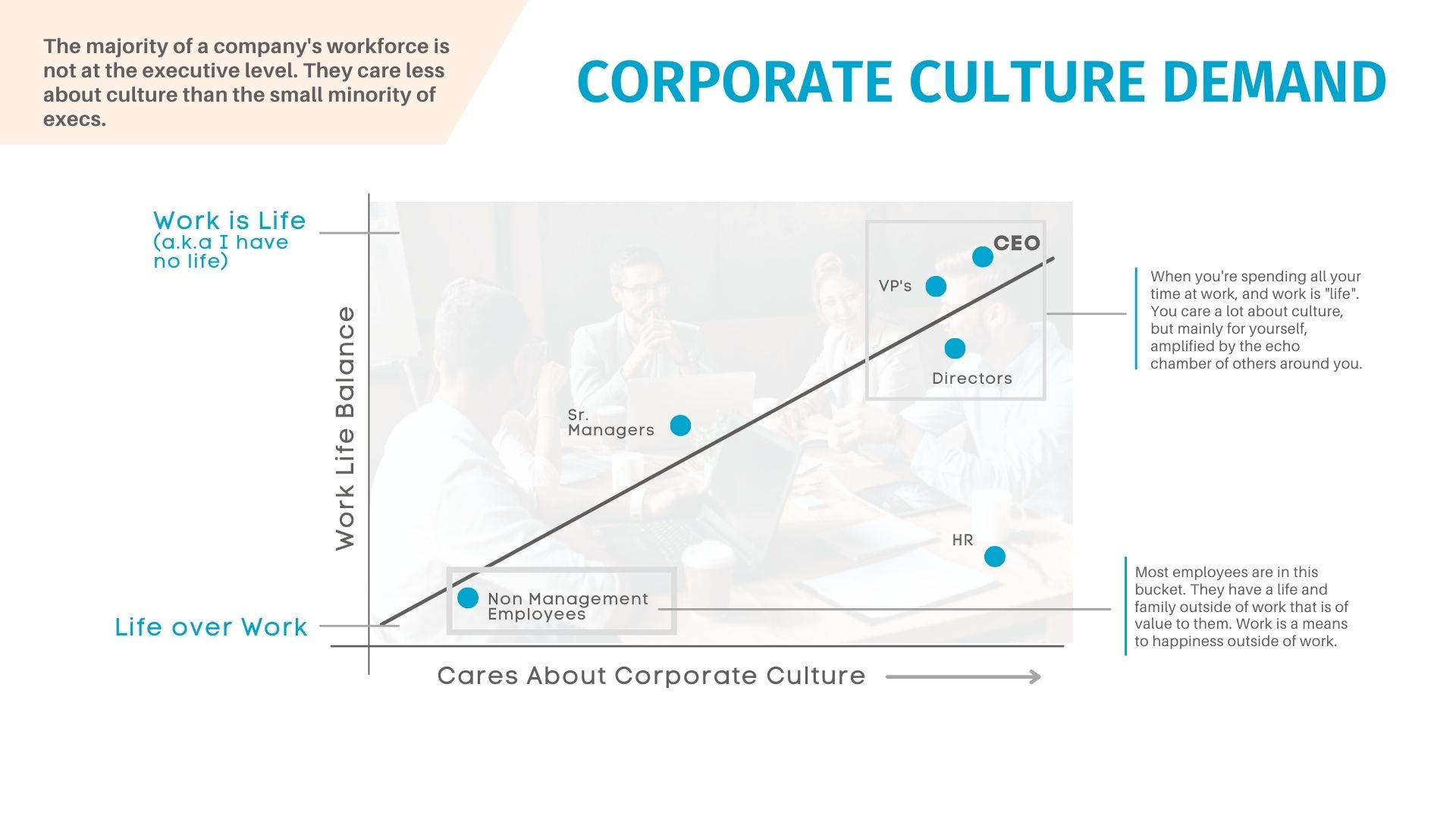
Most employees have a life outside of work and won’t want to work all the time. They see work as a means to make money to enjoy life. Management on the other hand is largely the opposite. They care about culture since they’re in working all the time and what matters to them is the life in the office. When you have no life outside of work, of course, you will care about culture.
Employees will foster a better “culture” by working from home and not being harassed by these “bros.”
What do employees really want from CEO’s and companies?
Applying Maslow’s Hierarchy of Needs to the corporate landscape, we can see how employees’ demand for culture takes a backseat. As a quick summary, Maslow, a psychologist, states that there is a core need that is to be satisfied before moving on up the ladder of what we value. Understanding employee’s wants and needs vs. shoving down what CEOs think is important to employees. There is a reason why employees are always asking for higher pay or wanting to WFH. How many times have you heard, “I’d rather take a pay increase (security) than an increase in job title (esteem).”
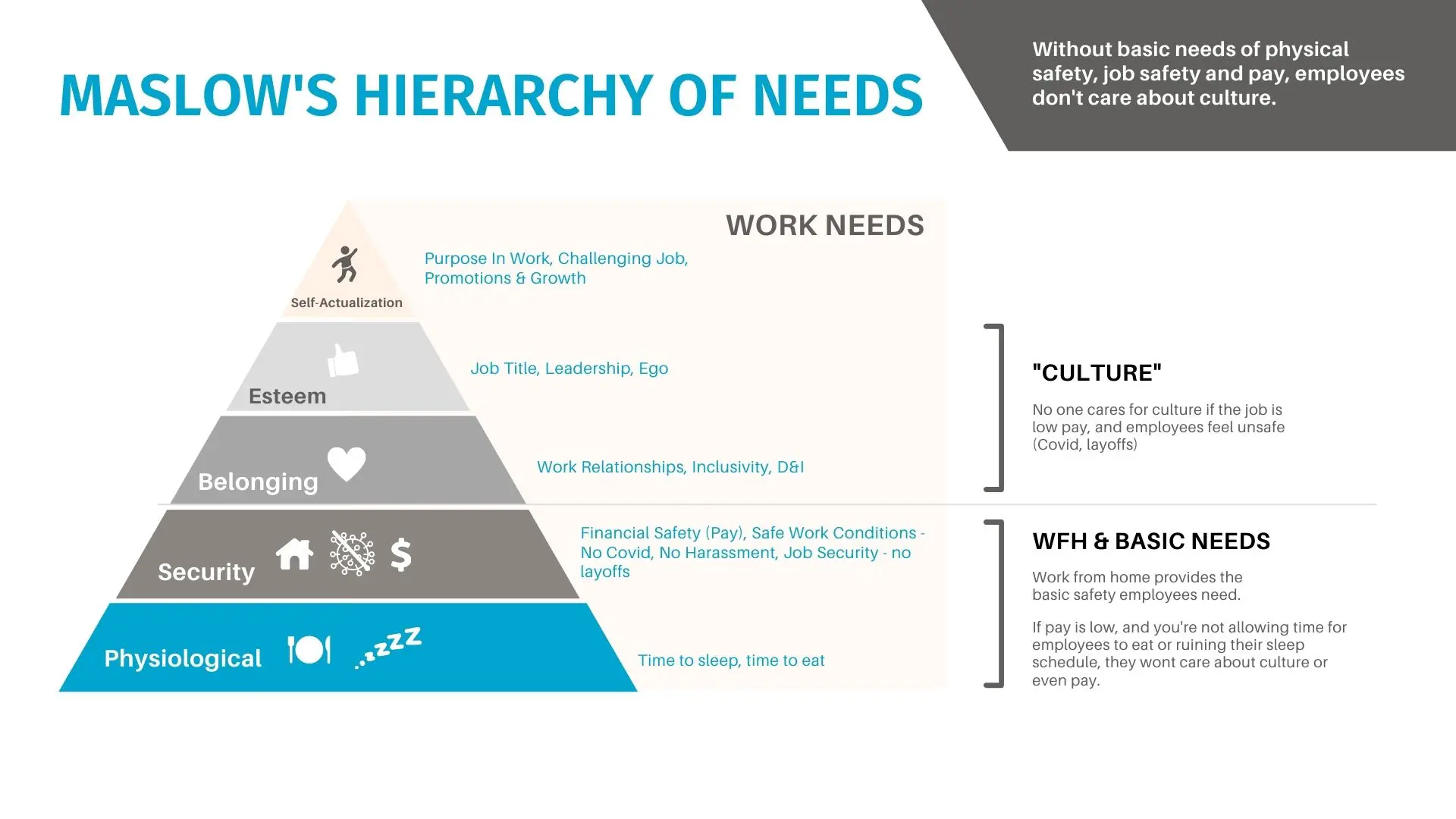
Work from home satisfies a lot of the basic work needs such as safety and security. Without that security (job security, security from harassment) employees do not care for the culture, which is higher up in the hierarchy. Conversely, you can pay them more, but at some point, money does not matter if you’re working so much you can’t even eat or sleep.
The Corporate Hierarchy And Culture of Fear
How does toxic corporate culture even develop?
Management hierarchy and impact on corporate culture
A lot of the corporate culture is rooted in the reporting hierarchy. Employees report to their managers, which report to directors, which report to VP’s. Your manager and director hold the keys to your career kingdom. They are the ones who will file the paperwork to promote you or justify a raise. If there is conflict in ideas, the “higher-ups” are the voices that usually win out.
Abuse of management power
Management realizes this and uses this implicit power and instill fear for anyone to speak out about wrongdoings. Even in day-to-day work, if you think you did something right, but in your manager’s eyes it’s not, your promotion is in jeopardy. Your promotions, salary, and general well-being are based on pleasing your manager. A.K.A being a “good” employee. Your manager is the one to file paperwork to promote you.
This hierarchy generally fosters the sense of ego and empowerment up the chain of command and where the “bro” nature comes out. Management can hide behind this unspoken fear (of no promotion, no raise & layoffs) to embolden their behavior.
We are all humans after all, some things may never change
No matter how much required corporate training management clicks through, we are all humans and can’t change 20 years of thinking after a 20-minute training video. We are judgemental and have emotions. It’s easier said than done to turn that off now you are in a workplace. As the Facebook Culture says “Be Yourself”, but it didn’t say anything about you not being a jerk to others.
Takeaways On Work From Home (WFH) And Corporate Culture
Culture can be a tricky subject. What CEOs value is out of touch with what employees value. Employers are afraid to lose power over their employees and cite preserving the corporate culture as a reason for in-office work.
I do want to acknowledge that some companies are genuinely good places that people want to work at. These are the companies that listen to their employees and create policies from the bottom up. The media cycle rarely covers those stories, and we only hear the bad ones. Dan Price and Gravity Payments set a good example of company culture and listening to its employees. He guaranteed a minimum 70k salary to his employees. Great things can happen when you actually put employees first.




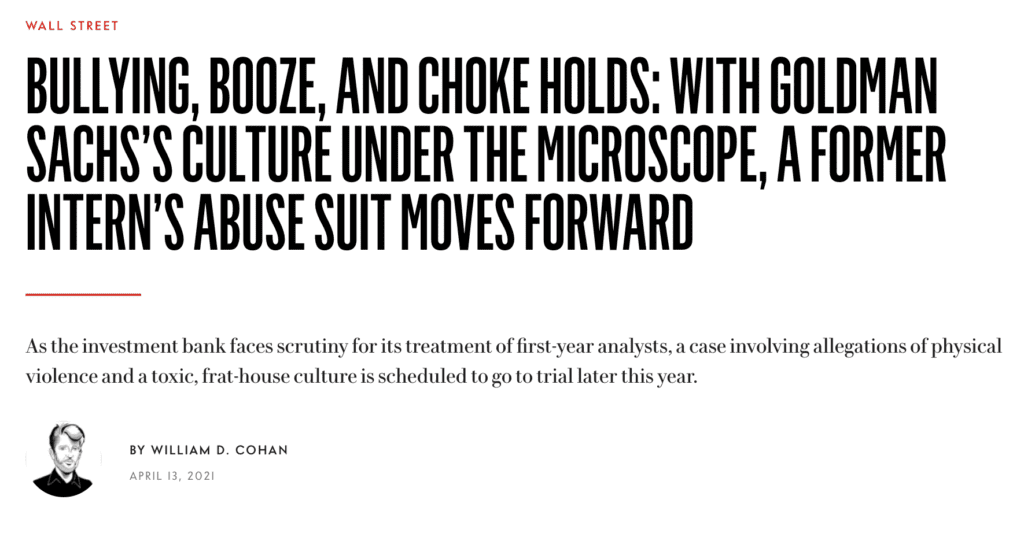
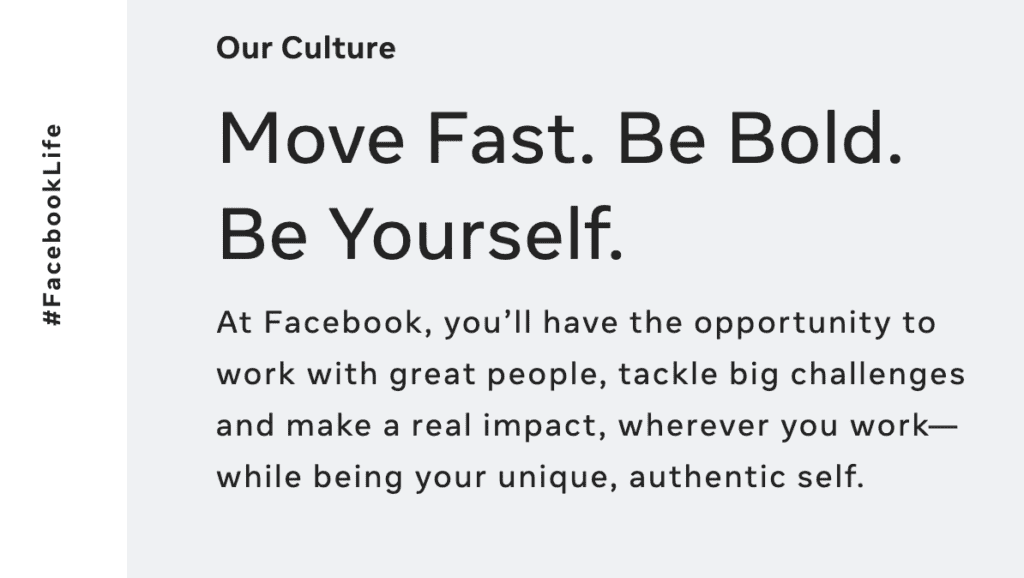
Hi overemployed.com editor,
We’ve got a customer willing to pay for a link in one of the existing posts in your blog.
Are you interested?
Thanks,
SheerSEO Sales Team
You can contact us at info (at) our domain – thanks!
I have been reading material on overemployed.com for a few months now, and can’t help but strongly agree with some of the points raised in the article and comments. Ironically, in the pre-pandemic era, I felt like I was someone who did well at the “game” i.e. promoted every few years, earmarked by management for development (they paid for my MBA), mentored by folks who had the ear of decision makers etc. But I never was, and never will be, an asshole or a “bro” as defined in the article. My current boss, with whom I have a great relationship based on mutual professional admiration, told me that I would need to be more cut throat in my decision making to realize my c-suite potential. As the pandemic upended our business (and I found myself in a management position with god-like influence over people’s lives) I witnessed first-hand how humans continue to behave like animals: survival of the fittest became our mantra. Even more discouraging was how leaders I admired reverted to egoistic and survival ensuring decision making. Needless to say my own rise in the company stalled and I paused, probably for the first time as a professional, to evaluate the goals I had been so relentlessly pursuing. I came to many of the same conclusions that others have shared. Corporate “culture” is broken, and geared towards rewarding a very specific type of person. Some, like me, don’t even realize the path they are / were on unless they hit a major inflection point in life. Through pure chance, a contract opportunity fell into my lap a few months ago that I took a chance on. I stumbled upon overemployed.com soon after as I started grappling with the challenges of managing both roles simultaneously. On a personal level, I know remote roles are what align with my priorities now. I imagine that I will make less money than a c-suite role but I believe I will live a more satisfied life away from the rat race. And as someone in his mid-30s, the short term earnings acceleration is a welcome financial windfall.
Over a couple decades I managed to claw my way to the middle. I believed the BS and put my life into… well… what has turned out to be quite meaningless… except for a pocketful of pesos. My life is worth much more.
It is literally all bullshit. I have seen CEOs guarantee employees that there will be no layoffs… just before cuts were made. I learned to shovel with the best of them. Human life is worth much more.
Organizations are simply a new type of feudalism…. the many working for the benefit of the few.
All of it… work-life, promotions, increases, diversity, culture, engagement… ALL OF IT is intended to maximize what is extracted from you… Kudos to the ones who have learnt to play the game and can extract a few more shiny things for themselves.
Sites like this will accelerate the ‘great realization’… that its all bullshit… much more is possible… and that you better focus on getting yours! “How can you ever give your more to receive your less” Bob Marley.
Amen, Please spread the word. The more others know the more they can be free. Unfortunately we all hear it ,but don’t internalize it until we experience these things ourselves.
Exactly! I appreciate the Bob Marley quote.
In my experience, many companies that have emerged from Facebook (senior leaders starting their own companies) continue with the Facebook cult-like workplace in their new companies. As you mentioned in your article, Facebook “discourages dissent and employees pretend to be happy”, which many of these FB spin-offs and branches also continue to propagate. Many of these companies do not want WFH because they want to control that ongoing belief, which is harder to do when you work remotely. I know one of these companies’ founders is pushing hard to return to the office because of fear of “losing control”, which is absolutely crazy. I am so glad I do not work for these abhorrent founders that present themselves as “humanitarians” and “friends of the employee” but internally create a system of bullying, divisiveness, and misery for employees. So freeing to work from home and Jx2!
Sometimes I think, is it possible these people can’t “control” things in their personal life, so they use the corporate hierarchy to get that feeling of “control”. It’s their way of feeling powerful and in control, and spend their life consumed at work as a visage for being in control of your life.
No amount of money will ever entice me back to Corporate America. I found the culture to be very cutthroat, nothing really was as it appeared. Upper Management always made things seem like “talk to us… we hear you.” I was a loyal and consistent performer and after nine years with the company, they decided I was no longer needed and laid me off. My manager bullied me the entire time I worked there. I used to think maybe I was just too sensitive however, ironically I received a phone call from her when she retired. She said I know I didn’t treat you very well but you never turned me into the ombudsman, I simply responded with “no I didn’t”. Frankly, it was freeing to know she knew her behavior all along was inappropriate but did it anyway. My coworkers were nice to my face and stabbed me in the back the first chance they got. I’m sure Corporate America has its place however, the fakeness and toxicity is a potent mix to be able to thrive in unless of course, you are one of the “players”. I will never allow another employer to dictate my worthiness. The experience, however, did teach me a lot about myself and what I will and will not tolerate. There are a lot of opportunities out there and I intend to find my space to bring value to others. The first place I intend to start is working from home.
Thanks for sharing. We all experience this journey, sadly many of us only realize the double standard after working many years. We’re all human, and we expect our peers (managers) will judge us and treat us in a righteous way because they are in a corporate environment? Please. If I were you, I would be afraid to speak up b/c of the fear of retaliation. Retaliation in the form of no promotion, where no one can prove your manager’s motive. Managers can always say you did not meet expectations, since it’s all subjective.